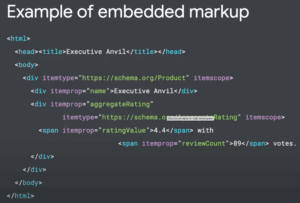The Invaluable Role of Schema Markup in Preparing for the Future of Generative AI Search
As we start the second quarter of 2024, consider taking the time to ensure that the schema markup on your website has been correctly implemented (or exists at all!).
Specifically, are you utilizing schema markup to its highest potential? Beyond using schema to relay the name, address, and phone (NAP) of your business to search engines, it can also be used to express specific aspects of your business, so that they can be more easily found in search. Schema is structured data that helps Google parse what the information is, allowing for the possibility of better presentation of search results, such as more visual treatments like images, videos, product review stars, and the like. Here is an example provided by Google:

This helps your website overall by making information more structured and thus more easily parsed by search engines. But also, it may be able to help future proof your site a bit. As search engines continue to use artificial intelligence to provide the best possible results, they can rely more heavily on the use of schema markup to fully understand the content on a page. When you implement schema correctly across your site, Google and other search engines use that data to create a knowledge graph that accurately conveys the information on your website, and organizes it in a structured way. Let’s get into more detail.
Enhanced Search Engine Understanding
By correctly implementing detailed schema markup, AI can recognize your content and tailor it to the appropriate audience. Implementing detailed schema markup may include providing specific information and details about:
- Products (there is special Product schema)
- Services (yes, there is Service schema)
- NAP (contact information, address, etc.)
- FAQs (there is also special schema for frequently asked questions)
- Service Areas (if you travel to the consumer, you can express this in schema for your specific service areas)
Regardless of the details you choose to include in your schema markup, it must be housed under the correct schema type, which can be found at schema.org. Note that schema is a complicated-looking series of code and data points, and it’s entirely okay to be confused by it upon first glimpse. It will very quickly begin to make sense to you as a template. Arc Intermedia can help walk you through it.
Once it begins to make sense, don’t forget to also add this information to your local business listing, as ensuring synchronicity between the two is paramount. When your local listing information doesn’t match the schema markup, search engines won’t be sure which source to choose, leading to decreased visibility. Ultimately, the more detailed information you have in your schema markup, the better chance you have at ranking highly for directly relevant queries.
Adapting to Search Generative Experience
Beyond directly relevant queries, detailed schema markup can help your content rank for related queries that might have been previously difficult to rank for.
Search Generative Experience (SGE) uses AI to allow search engines to generate summaries, answers, and even entire articles based on the structured data available on the web. This recent and still developing feature potentially makes it especially imperative for businesses to implement detailed schema markup that presents a holistic view of their website. This can ensure that AI systems accurately interpret and utilize your content in generative responses. Adapting to SGE by using detailed schema markup can help to position your content as a primary source for direct and contextual queries, thereby increasing the visibility and relevance of your content in AI-driven search results.
Future-proofing for AI Advancements
Beyond SGE, AI is currently affecting other areas of search and will continue to do so for the foreseeable future. Websites incorrectly implementing their schema markup or not taking full advantage of it might find themselves at a disadvantage as AI algorithms continue to improve.
This is because schema markup plays an invaluable role in providing a structured framework that AI can understand and analyze with precision. By keeping your schema markup up-to-date and comprehensive, you’re laying the groundwork for seamless integration with future AI updates. This includes voice search, which continues to rise in ever-increasing popularity due to voice assistants like Siri, Alexa, and Google Assistant.
However, effectively utilizing schema markup isn’t the only factor to consider when optimizing for the impact artificial intelligence is having on search. As always, creating informative and helpful content should be the first and foremost priority. As artificial intelligence advances, we can expect it to become increasingly adept at discerning the readability, relevance, and overall quality of content. Therefore, the dual approach of ensuring your website is creating unique and valuable content alongside effectively utilizing schema markup is of the utmost importance. Embracing both approaches can adapt your content to both the present and future of SEO, where generative AI plays an integral part in how we find and absorb valuable information online.
If your organization is concerned about the impact that AI will have on your website, consider partnering with Arc Intermedia for an expert SEO consultation. We can also check if your schema is in order.


